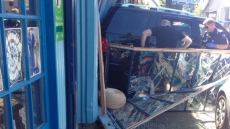The president of Imperial Metals has apologized to residents living downstream from a toxic flood from one of the company's gold and copper mines in the British Columbia Interior.
Brian Kynoch told about 200 residents of Likely, B.C., 600 kilometres northeast of Vancouver, that the failure of the tailings pond at the Mount Polley mine has been stabilized but the investigation is just beginning.
"I apologize for what happened," Kynoch said at the emotionally charged meeting Tuesday night.
"If you had asked me two weeks ago if that could happen, I would have said it couldn't happen, so I know that for our company it's going to take a long time to earn the community's trust back."
The breach released 10 million cubic metres of water and 4.5 million cubic metres of toxic silt into Polley Lake and Quesnel Lake.
A ban remains in place on all consumption or recreational use of the Quesnel and Cariboo river systems from the spill site to the Fraser River, several hundred kilometres away.
Kynoch said the company will clean up the slurry that breached an earthen dam at the mine.
Despite assertions that the company had been warned of potential problems, Kynoch said the dam had never before failed. Levels in the tailings pond were too high and there was some overflow into the creek in May, he said.
"These things should not happen so we do need to know why it happened. It's not just for this site. We need to know why that failed because it's not supposed to fail."
B.C. Energy and Mines Minister Bill Bennett said ministry inspectors were at the mine investigating the cause of the failure and Environment Ministry staff were conducting water tests to determine the full extent of environmental impacts.
Al Richmond, of the Cariboo Regional District, said tests were being expedited and results are expected by Thursday.
The regional district declared a state of local emergency early Wednesday. The move will allow access to additional resources that may be needed to further protect the private property and government infrastructure in Likely.
Kynoch said water from the tailings pond was "very close to drinking water quality," though the silt - the "ground-up rock" left over after extracting the metals - poses a problem.
A summary of material dumped into the tailings pond last year was filed with Environment Canada. It said there was 326 tonnes of nickel, over 400,000 kilograms of arsenic, 177,000 kilograms of lead and 18,400 tonnes of copper and its compounds placed in the pond last year.
"Specifically, mercury has never been detected in our water and arsenic levels are about one-fifth of drinking water quality," Kynoch told residents.
"We regularly perform toxicity tests and we know this water is not toxic to rainbow trout."
The water use ban is in place to "err on the side of caution," Kynoch said.
A logging company crew was able to tow a log jam away from the Quesnel River, averting potential flooding or damage to a bridge in Likely but residents were frustrated with the lack of information in the hours and days after the breach.
Diane Gibson, owner of the post office and restaurant on the Likely riverfront, said she heard nothing until she went to nearby Williams Lake and overheard the news in a store.
And Alfred Hillary, a business owner who lives just below the mine, said their phones were out and he didn't receive a phone call. He heard about the breach over his emergency responder radio.
Hillary blamed the mine for failing to address earlier problems.
But in the small community devastated by the downturn in the local forest industry, many residents were prepared to stand by the company.
"This town relies upon Mount Polley, so we're hurting," Gibson said. "I, personally, don't blame Mount Polley. There are lots of people who will point fingers. It is unnecessary to point fingers until we're in full view of the facts.
"Needless to say, it's going to hurt us regardless of whose fault it is."
"We can be very, very thankful that nobody was hurt in this."





